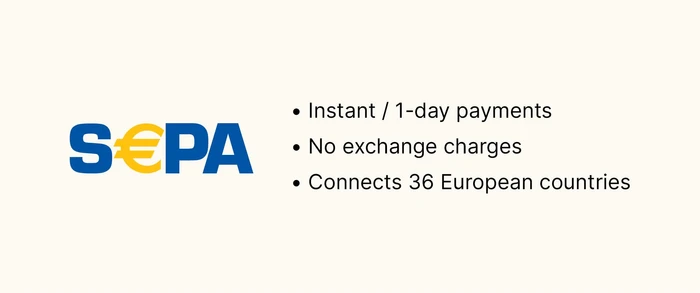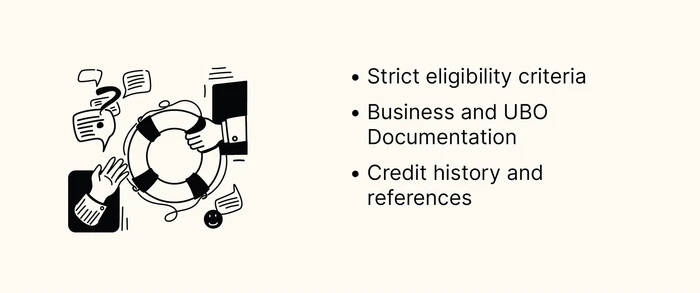Opening a business bank account in the EU as a non-resident
Non-resident businesses can benefit hugely from having a business bank account in the European Union (EU). The process of opening such an account may present challenges due to varying requirements across countries and multiple regulations. In this guide, we will discuss these benefits as well as how one would go about setting up their own business bank account as a foreigner within the EU. Understanding these advantages along with potential difficulties is key for setting up successful operations overseas.
Short Summary
- SEPA offers quick and secure euro payments across all the Europe, however, getting access to this scheme is more challenging for non-resident businesses.
- Eligibility criteria, extensive documentation, credit history checks and references may be required when opening a business bank account in the EU.
- Alternatives such as second-tier banks or fintech solutions offer more flexible and cost-effective options.
- Engaging an agent/legal firm can prove helpful for some businesses.
SEPA and its benefits for non-resident business

The European Union created SEPA, or the Single Euro Payments Area, to provide a secure and cost-efficient means of transferring funds between any two points within Europe. This simplified system could also be beneficial for non-resident businesses that wish to engage in regular business transactions with European companies and individuals with ease – having a local account that supports SEPA means no unnecessary currency conversion through European banks and, consequently, no extra fees.
Though this platform offers convenience and security, obtaining access to a local EUR account may be a challenging task for a foreign company – this is due to stringent KYC checks. It often requires weeks or even months of communication with the bank and involves extensive paperwork with no guarantee of a successful account opening. Despite these potential drawbacks, the SEPA scheme still proves invaluable for companies outside the EU looking forward to trading their goods and services across this region.
Challenges of opening business bank accounts in the EU for non-residents

Non-residents who wish to open a bank account in Europe for business purposes, have to face the challenge of going through rigorous checks imposed by traditional high street banks. Banks tend to prefer low-risk clients, some of them require proof of substantial funds or high planned turnover. When selecting an appropriate European bank, you may consider well-known international banks with branches overseas such as HSBC, Lloyds or Barclays if you already have one of their accounts. You can also select one of the local or regional banks with potentially simpler onboarding procedures. Alternatively, Fintech platforms offering online financial services can be just as advantageous. We'll talk more about them further in this article.
Eligibility criteria for non-residents
For non-residents who are interested in opening a business bank account within the EU, there are eligibility criteria that must be met. To prove your business is 'worthy' of a local non-resident bank account, you'll have to supply numerous documents (translated and notarised in high street banks case), to undergo credit history checks as well as business and identity verification.
To make sure these requirements are fulfilled successfully, let's take a more thorough look into how to prepare for opening such an account with a business banking service provider.
Necessary documentation
When opening a business account, it is important to make sure all the needed documents are acquired and that the specific requirements of your chosen bank in its corresponding country are met. In Germany, for example, non-residents with freshly registered German companies may need to submit such paperwork as the share ownership structure, company registration certificate and their business plan before proceeding with an application.
For those businesses outside Europe wishing to open a corporate account, there will be even more requests focused on proving 'Substance' – a valid reason for needing a business account in a country of your choice. Signed contracts with business partners along with invoices showing proof of address plus evidence of locally registered companies or tax ID numbers must also be provided.
By gathering these necessary materials upfront you can ensure a quicker journey towards acquiring the desired banking services.
Credit history and references
When non-residents try to open a local bank account in the EU, they will notice that credit history requirements can vary among countries and financial institutions. To know what specific conditions are required for opening a European business banking account, it is recommended to ask this information directly from the respective banks. Some may require non-resident business owners to provide personal credit history reports from their home country or from an international credit agency. Others may assess the creditworthiness of the business based on alternative criteria, such as the company's financial statements, business plan, or existing relationship with the bank.
Verifying the background of non-citizens may be more complicated due to having no prior involvement in commercial activities there. These people can increase their chances by proving that they have had good standing along time and providing proper evidence such as references supporting this fact.
Country-specific requirements and procedures
Non-residents looking to open a business bank account in the EU should take time to research and become familiar with country and institution-specific regulations. Depending on where you decide to pursue your endeavour, requirements may vary greatly, thus making understanding local laws paramount for achieving success when opening an account abroad. For example, registering as a foreign entity within Ireland can be quite complex depending on circumstances, e.g., non-EU residents require to receive a special permission under the Immigration Investor or Start Up Entrepreneur programmes.
Preparing yourself for different procedures across various countries will result in successful navigation of opening a business banking establishment when operating outside one's own nation.
Second-tier banks and their advantages

There is a big number of local and regional second-tier banks in the banking and financial sector in the eastern area of the EU with typically more relaxed requirements than those found, for example, in Germany or Switzerland. Even so, there may still be significant monthly charges or a turnover exceeding €50,000 needed to open an account, for example.
For non-residents, it can be advantageous to look into second-tier bank options as some of them offer facilities like lower deposit demands and remote account openings while accommodating risk tolerance standards superior to other major international banking hubs outside Europe.
On the other hand, well-known tier-one international banks have their advantages too - sometimes submission of documents and director's identity verification may be done by visiting a local branch in your country and removing the need for international travel.
Fintech alternatives to traditional banks

Non-residents looking to open an online bank account in the EU now have alternatives provided by fintech companies, like Wise, Revolut, Payoneer (some of the mainstream companies that prefer automated onboarding and low-risk profile businesses) or industry-tailored solutions like MultiPass that are ready to invest more time and attention to KYC checks for underserved businesses from other niches. These platforms offer lower fees for payments in foreign currencies than traditional banks with no minimum transaction amounts, making them an attractive option for businesses worldwide.
For instance, with MultiPass you can hold multiple currency balances on your own corporate IBAN account while also making and receiving local transactions in euro, pound sterling and dollar along with international payments made to pretty much any point of the globe via SWIFT.
Opening a business bank account online could be beneficial for non-resident businesses due to flexible offerings, digital-first user experiences and personal support which is typically reserved only for top tier clients in regular traditional banking institutions. Another huge bonus of electronic money institutions is fully remote onboarding. Most banks in Europe are old-school when it comes to business owners identity verification, and still require personal visit to the bank branch. For those seeking the convenience of remote service, EMIs are the way to go.
Using an agent or legal firm for assistance

For non-residents interested in opening a traditional bank account in Europe, engaging an agent or legal firm can provide several key advantages. Such services help ensure the confidentiality of your financial information as well as offer advice on applicable laws and regulations that must be followed. This is an additional expense but one that can streamline the process of finding a suitable financial institution to work with, which can be a huge time-saver for companies with complex business models or ownership structures.
Using the assistance of such agents makes it easier to open accounts across multiple European countries including Estonia, Austria, Portugal, Czech Republic, Lichtenstein, Cyprus, Malta and others. However, for those interested in onboarding with fintechs/electronic money institutions, this service may not be necessary. These institutions are typically more reachable and can provide direct guidance on eligibility criteria without the need for intermediaries. If you're interested in whether your business can be onboarded with MultiPass, use our handy pre-check tool or contact our friendly team.
Summary
Opening a business bank account in the EU can be complicated for non-residents, as there are different requirements and procedures across countries. Most European banks and financial institutions have a very meticulous approach to due diligence measures for AML and KYC compliance.
However, you don't need to open new legal entities and rent offices abroad to start transacting in euro with your EU counterparts. With MultiPass you can open a multi-currency account and make instant SEPA payments in every European country. MultiPass accounts also come with local US and UK account details, instant currency exchange and 100% online onboarding.
Frequently Asked Questions
Can a foreigner open a business bank account in the EU?
Yes, it is possible, however, the process of opening a bank account is overall trickier for foreigners. Different banks and EMIs have their own eligibility criteria, however, when approaching any of them be ready to gather and submit lots of documentation to prove your business's economic substance.
Can a UK resident open a euro business bank account?
Yes, UK residents can open a Euro business bank account. The United Kingdom is still part of the SEPA zone so many British banks and e-money institutions offer Euro business accounts along with Pound Sterling accounts.
Can I open a UK business bank account if I live abroad?
If you're not a UK resident and want to open up a business bank account, it is possible. You must first register your company and present the documents needed for approval. It's wise to look into each banking institution's terms of service before submitting your application since some might require additional proof. With that said, owning a business account in GBP can be obtained even if living outside the country! For example, MultiPass welcomes companies from a wide list of jurisdictions.
How do I open a business account in Europe?
If you're looking to establish a business bank account in Europe, it's critical that you look into the banking rules for whichever country of operation. When setting up your new account, be sure to provide proof of identity and location as well as any additional needed info depending on the nation.
Onboard 100% online and start making SEPA payments